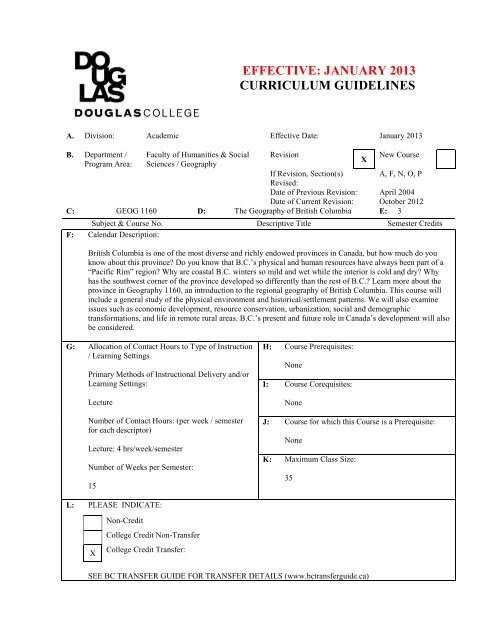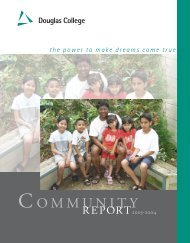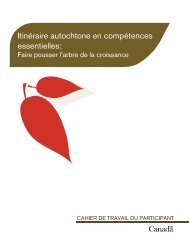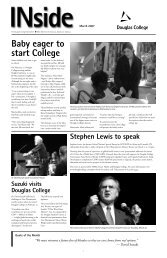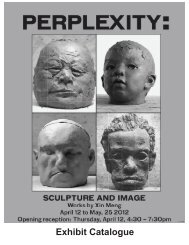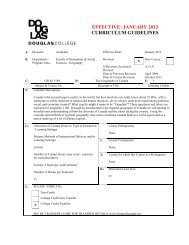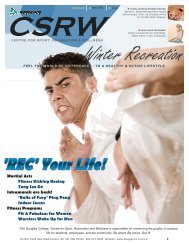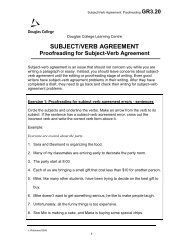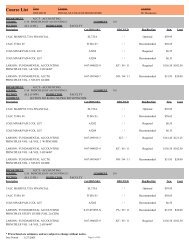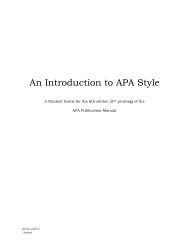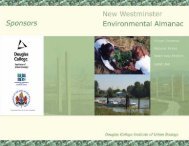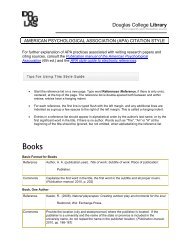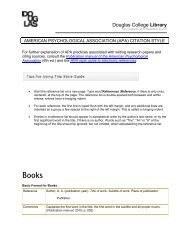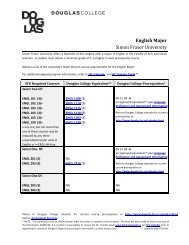GEOG 1160 - Douglas College
GEOG 1160 - Douglas College
GEOG 1160 - Douglas College
You also want an ePaper? Increase the reach of your titles
YUMPU automatically turns print PDFs into web optimized ePapers that Google loves.
A. Division: Academic Effective Date:<br />
B. Department /<br />
Program Area:<br />
Faculty of Humanities & Social<br />
Sciences / Geography<br />
EFFECTIVE: JANUARY 2013<br />
CURRICULUM GUIDELINES<br />
Revision<br />
X<br />
January 2013<br />
New Course<br />
If Revision, Section(s)<br />
Revised:<br />
A, F, N, O, P<br />
Date of Previous Revision: April 2004<br />
Date of Current Revision: October 2012<br />
C: <strong>GEOG</strong> <strong>1160</strong> D: The Geography of British Columbia E: 3<br />
Subject & Course No. Descriptive Title Semester Credits<br />
F: Calendar Description:<br />
British Columbia is one of the most diverse and richly endowed provinces in Canada, but how much do you<br />
know about this province? Do you know that B.C.’s physical and human resources have always been part of a<br />
“Pacific Rim” region? Why are coastal B.C. winters so mild and wet while the interior is cold and dry? Why<br />
has the southwest corner of the province developed so differently than the rest of B.C.? Learn more about the<br />
province in Geography <strong>1160</strong>, an introduction to the regional geography of British Columbia. This course will<br />
include a general study of the physical environment and historical/settlement patterns. We will also examine<br />
issues such as economic development, resource conservation, urbanization, social and demographic<br />
transformations, and life in remote rural areas. B.C.’s present and future role in Canada’s development will also<br />
be considered.<br />
G: Allocation of Contact Hours to Type of Instruction<br />
/ Learning Settings<br />
Primary Methods of Instructional Delivery and/or<br />
Learning Settings:<br />
Lecture<br />
Number of Contact Hours: (per week / semester<br />
for each descriptor)<br />
Lecture: 4 hrs/week/semester<br />
Number of Weeks per Semester:<br />
15<br />
L: PLEASE INDICATE:<br />
X<br />
Non-Credit<br />
<strong>College</strong> Credit Non-Transfer<br />
<strong>College</strong> Credit Transfer:<br />
H: Course Prerequisites:<br />
None<br />
I: Course Corequisites:<br />
None<br />
J: Course for which this Course is a Prerequisite:<br />
None<br />
K: Maximum Class Size:<br />
SEE BC TRANSFER GUIDE FOR TRANSFER DETAILS (www.bctransferguide.ca)<br />
35
<strong>GEOG</strong> <strong>1160</strong> Page 2 of 3<br />
M: Course Objectives / Learning Outcomes:<br />
At the conclusion of the course the successful student will be able to:<br />
1. Synthesize the concepts and techniques of regional geography.<br />
2. Communicate effectively orally, graphically, in writing, and using quantitative methods.<br />
3. Create, interpret, analyze and utilize maps.<br />
4. Evaluate and make informed decisions about contemporary British Columbia issues using the<br />
methodologies, concepts and techniques of regional geography.<br />
N: Course Content:<br />
1. Introduction<br />
- Definition of area<br />
- Regional concepts as applied to British Columbia<br />
- Core/periphery model<br />
2. Physical Setting<br />
- Tectonic processes<br />
- Geomorphology and physiographic regions<br />
- Climate<br />
- Biogeography<br />
3. Historical Background<br />
- Prehistory<br />
- Exploration and resettlement<br />
- First Nations experiences<br />
4. Economic Setting<br />
- Infrastructure<br />
- Transportation network<br />
- Resource development<br />
- Forestry<br />
- Fishing<br />
- Mining<br />
- Agriculture<br />
- Energy<br />
- Water<br />
- Government intervention<br />
- Resource management and conservation<br />
- Manufacturing<br />
- Tourism and Recreation<br />
- Tertiary and quaternary industries<br />
- Land use conflicts and treaty negotiations<br />
5. Urban and Social Issues<br />
- Urban development<br />
- Rural settlement<br />
- Demographic studies<br />
- Cultural diversity/ethnicity<br />
- Environmental challenges<br />
6. British Columbia and Canada<br />
7. Future Issues<br />
O: Methods of Instruction:<br />
The course will employ a variety of instructional methods to accomplish its objectives, including some of the<br />
following: lecture, labs, field work, DVDs/videos and animations, individual and/or team projects, small group<br />
discussions and map and air photo analysis.<br />
P: Textbooks and Materials to be Purchased by Students:<br />
Texts will be updated periodically. Typical examples are:<br />
McGillivray, B. (2010). Geography of British Columbia: People and Landscapes in Transition. Vancouver:<br />
UBC Press.
<strong>GEOG</strong> <strong>1160</strong> Page 3 of 3<br />
Q: Means of Assessment:<br />
Evaluation will be based on course objectives and will be carried out in accordance with <strong>Douglas</strong> <strong>College</strong><br />
policy. The instructor will provide a written course outline with specific criteria during the first week of classes.<br />
An example of a possible evaluation scheme would be:<br />
Assignments 40%<br />
Class Preparation and Participation 10%<br />
Mid Term Exam 25%<br />
Final Exam 25%<br />
100%<br />
R: Prior Learning Assessment and Recognition: specify whether course is open for PLAR<br />
Yes, students may take a challenge exam to apply for recognition of prior learning.<br />
Course Designer(s): Don McPhee, M.A.<br />
Sarah Paynter, M.A.<br />
Dean: Catherine Carlson, Ph.D. Registrar<br />
© <strong>Douglas</strong> <strong>College</strong>. All Rights Reserved.<br />
Education Council / Curriculum Committee Representative


